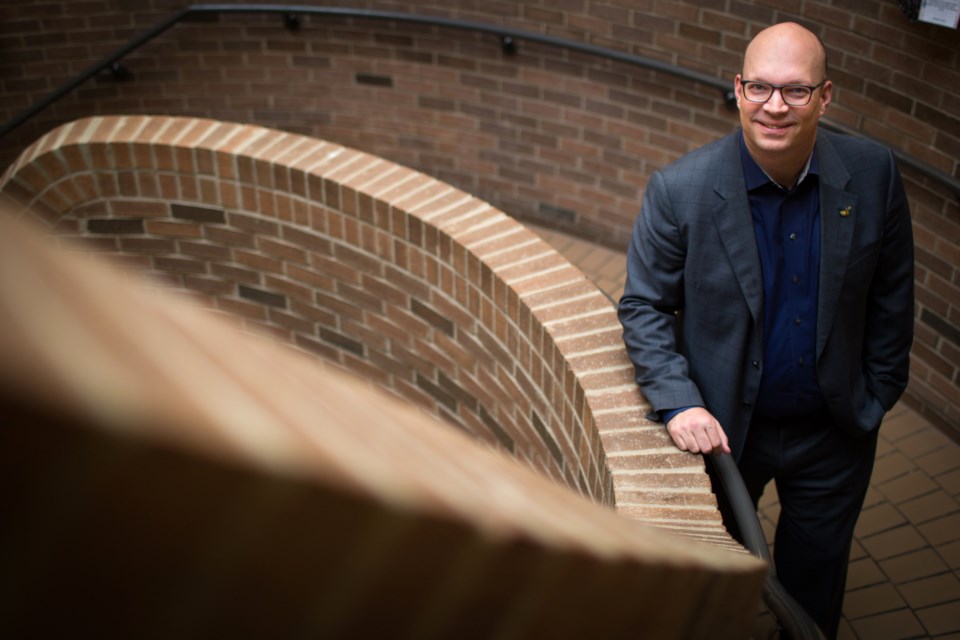Dr. Kristopher Wells is confident three bills introduced by Alberta Thursday will be struck down in court, but worries the province has moved decades in reverse nonetheless.
They ban gender-affirming surgeries and medications in children, establish new rules for all-female athletic competition, require parents to opt in to sexual education, and require teachers and school boards to inform parents of formal pronoun changes by students.
Premier Danielle Smith says the proposed legislation is about protecting children from making potentially life-altering choices – particularly surgeries or treatments that would prevent them from reproducing – until they are adults.
“Childhood at a time of self-discovery, and we want children and youth to have the time to gain experience and explore all opportunities available to them as they grow into adulthood,” she said.
Teens at least 16 years of age will be able to access puberty blockers with the sign-off of their parents, a doctor and a psychologist; minors who have already been "prescribed hormone therapies to treat gender dysphoria or gender incongruence will be able to continue with this process.
“These policies are designed and intended to help preserve the choices children have before they make serious decisions about their bodies,” the premier continued, “or the ability to have children of their own one day or undergo potentially permanent procedures, the benefits and risks of which are not yet fully understood.”
Senator Wells, who was appointed to the Red Chamber in September, said Thursday the United Conservative Party is driving “Alberta back 50 years.
“(Smith) couldn't even find one medical doctor from the province of Alberta that would stand up beside her and say that these policies and legislation were a good idea because all of the medical professionals know that this isn't just about attacking trans people, this is about attacking our healthcare system and attacking the professionalism and the autonomy of our doctors,” he said from Ottawa.
“I think today is a dark day in Canadian history. Here we have a provincial government in Canada that has introduced some of the most discriminatory anti-2SLGBTQI legislation since Confederation.”
Wells said Smith is catering to an extreme wing of her party’s base in advance of a leadership review. More than 5,000 UCP delegates are expected to vote at a conference in Red Deer that begins today, Nov. 1.
“It’s unfortunate that Danielle Smith keeps turning Alberta into a place like Alabama each and every day,” he said. “The irony of this being introduced on Halloween, is not lost where Danielle Smith is trying to paint the trans community as some kind of a monster that needs to be, you know, contained and controlled.
“This isn't about evidence. This is all about ideology. And what's most disconcerting about all of this is that she's willing to sacrifice vulnerable young people and their health and their well-being for her political ambitions.”
Alberta-based Skipping Stone Foundation and national 2SLGBTQI advocates Egale said in a joint statement they would see the province in court.
“Egale Canada and Skipping Stone Foundation jointly condemn, in the strongest possible terms, the discriminatory legislation put forward by the government of Alberta,” the Oct. 31 statement read. “We will be taking legal action and using every tool at our disposal to stand up for the rights, safety and freedoms of 2SLGBTQI young people in Alberta.
Smith said “we should wait and see how it plays out” when asked whether she would invoke the notwithstanding clause as Saskatchewan Premier Scott Moe, who last week won a fifth straight majority, has done in that province.
She told reporters on a call she thinks the new legislation is balanced and reasonable, and therefore would survive its day in court. She doubled down on that belief with CTV’s Power Play later in the day.
“The Charter allows for politicians and governments to make decisions that are reasonable and demonstrable in a free and democratic society,” she said. “That’s one of the parameters of the Charter … I think that it will stand up.”
Wells pointed out it would be Alberta taxpayers footing the bill when the province is in court fighting what he is certain will be a losing battle.
“Albertans need to remember who's going to be funding those legal challenges,” he said. “The government is going to be spending millions of dollars trying to defend these discriminatory policies rather than on other issues that Albertans care about more.”




